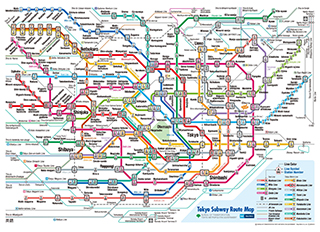HOME > Subways in Japan > Toei Subway
- Subways in Japan
- Sapporo Municipal Subway
- Sendai Municipal Subway
- Tokyo Metro
- Tokyo Municipal Subway
- Yokohama Municipal Subway
- Nagoya Municipal Subway
- Kyoto Municipal Subway
- Osaka Metro
- Kobe Municipal Subway
- Fukuoka Municipal Subway
- Hokuso Railway
- Saitama Railway
- Toyo Rapid Railway
- Yokohama Minatomirai Railway
- Hiroshima Rapid Transit
2-8-1 Shinjuku, Shinjuku-ku, Tokyo 〒163-8001
TEL 03-5321-1111 (Main switchboard)
FAX 03-5388-1651 (General Affairs Department, Customer
Service Section)
URL
https://www.kotsu.metro.tokyo.jp/eng/
Overview of Operations
The Beginnings of the Toei Subway
From the 1950s, as the population of Tokyo swelled and road traffic volume dramatically increased, the effectiveness of existing public transport infrastructure such as the streetcar system steadily declined due to chronic road congestion. As a result, the provision of a subway to combat the infrastructure problems became a pressing issue. In accordance with town planning directives, the Tokyo Metropolitan Bureau of Transportation received a license from the Teito Rapid Transit Authority for a first line (the current Asakusa Line) between Kuramae and Magome Stations, and started construction of the line as Toei Subway system.
Progress towards the Current Toei Subway: 4 Lines over 109 Kilometers
Since the Toei Subway began operation of the 3.1km Asakusa Line between Asakusa Bridge and Oshiage Stations in December 1960, the system has seen expansion as it opened the Mita Line in December 1968, the Shinjuku line in December 1978, the Oedo Line in December 1991. Further to this, the Mita Line was extended between Meguro and Mita Stations, and the Oedo Line commenced full operation in December of the same year, bringing the total length of operation on all four lines to 109km, and the total number of stations to 106. In the fiscal year of 2015, the Toei Subway carried an average of 2.6 million passengers a day.
With the aim of increasing convenience for passengers, the lines of the Toei Subway provides through services to other railway companies lines. The Asakusa Line links with the Keikyu, Keisei, Hokuso, Shibayama Railway lines, the Mita Line with Tokyu Railway line, and the Shinjuku Line with Keio Railway line.
Guarantee of Safety and Peace of Mind
On the Toei Subway, trains are controlled by a Programed Traffic Control (PTC) system, main part of which is comprised of Centralised Train Control (CTC) system. On the Asakusa Line, an Automatic Train Stop System (ATS) is in place, while on the Mita, Shinjuku, and Oedo Lines, an Automatic Train Control (ATC) system has been introduced to ensure safety. Emergency stop buttons have been installed on all station platforms along with station staff call points to be used in the event of an emergency. Braille guidance blocks are available for visually-impaired passengers in all stations, and progress continues in installing movable platform fences. In terms of safeguarding against natural disaster, a number of measures have been introduced. In preparation for a large-scale earthquake, elevated bridge supports and supporting columns are being reinforced, whilst flood-prevention measures have taken the form of watertight doors or water sealing plates installed in places like station exits to prevent water inflow. For the people stranded at the city center in the event of an earthquake directly beneath the capital, provisions of food and water, thermal blankets, mats, torches, and portable toilets are prepared to provide people temporary shelter in stations.
Toei: A People-friendly Subway
On the Toei Subway, installation of elevators and other measures to offer one route from ground level to the platform, as well as multipurpose toilets for those with disabilities has been completed across all stations. Designated wheelchair spaces have been included on all cars, along with four priority seats in each carriage (limited to 2 in the foremost carriage). In addition, easy to grip handles and low, accessible suspended handles are increasingly being provided on trains – all helping to achieve the goal of a ‘People-friendly Subway cars’.
Services for Tourists from Abroad
Concierges are deployed to stations that are frequently used by foreign visitors, and they offer information about the local area, as well as transfer advice. All ticket booth operators are provided tablet devices to assist passengers with detailed quick advice. Advanced ticket machines have been introduced from which it is possible to search for a variety of information, including route maps, in multiple languages. Regular ticket machines are also increasingly available in a number of different languages. Further to these initiatives, the provision of free station Wi-Fi is expanding, alongside provision within carriages.
-

- Movable Platform Fences/Installed in every station on the Mita and Oedo Lines.
-

- Water Sealing Plates/In the event of a flood, station exits and entrances are protected by water sealing plates to prevent water inflow.
-

- Accessible multipurpose toilets/Station toilets are designed to be accessible to all. Facilities include ostomate equipment, baby seats and more.
-

- Designated wheelchair spaces/Available on every train.
-

- Tablet devices/Available at service booths in every station. Equipped with various applications to provide detailed information and guidance.
-

- Advanced ticket machines with multilingual support/These advanced machines can be used to search for route maps and tourist information in multiple languages, including Japanese, English, Chinese (Simplified/ Traditional), Korean, French, Spanish, and Thai.
Enquiries
Enquiries/ Lost Property/ Customer Opinions: 03-3816-5700 (Toei Customer Service Center)
![]()

